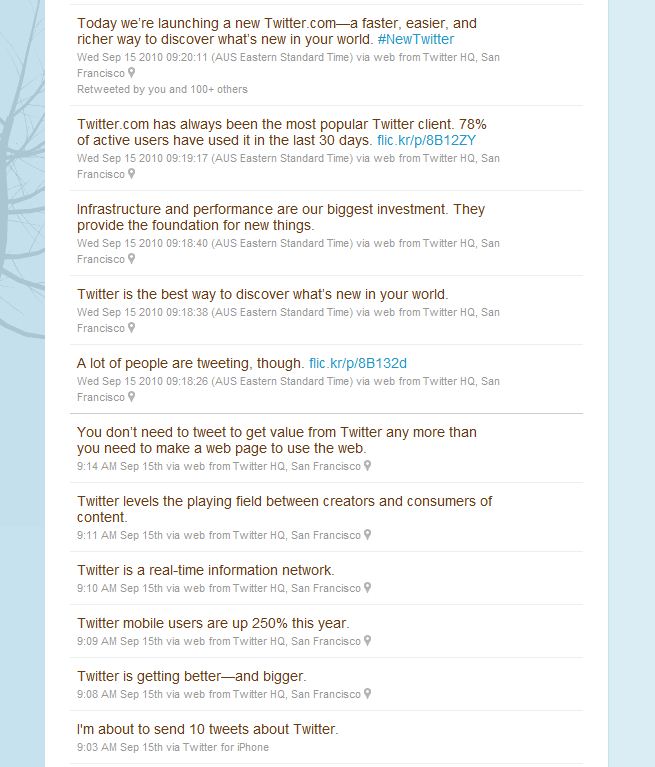
|
Haig KayserianProfileHaig Kayserian founded KayWeb in 2003 after graduating with a BA in Media and Communications from Sydney's Macquarie University.
Other facts about Haig KayserianFavourite Sport(s)Football (Soccer), Rugby League Favorite Movie(s)Scarface, The Departed, Screamers Favourite TV Show(s)Underbelly, Q & A, House, West Wing, Seinfeld Favourite Website(s)www.theworldgame.com.au, www.digidirect.com.au, www.kayweb.com.au, www.google.com Quote:"Always underpromise and overdeliver..." |
All entries by Haig Kayserian
04 November 2010
Flexibility required for .au domain registration, renewal periods
At the moment, you can only register an Australian domain name (.com.au, .net.au, .org.au, etc.) for a period of 2 years. With other domain extensions, like the .com, you are able to register the domain for 1-10 years, and any 1 year increment in between.
So far, this flexibility has not been afforded to .au domain names for reasons other than what is in the interests of the typical domain owner.
The typical .au domain name owner is the owner of a business or a brand, as to register the most popular .au domain name - the .com.au, one must verify their commercial validity via an ABN (Australian Business Number) or an ACN (Australian Company Number).
This issue of allowing more flexibility is being discussed in the .au Domain Administrator (.auDA) Names Policy Panel, of which I am a member.
In researching for meetings, I have discussed increasing flexibility in .au domain name registration and renewal periods with friends in and out of the internet industry, and every single one states they would appreciate the flexibility of registering .au domain names longer term, and even shorter term.
Shorter term registrations - of 1 year instead of the currently-stipulated 2 years - is particularly relevant to domains registered for events and/or promotions, which only have a short-term lifespan.
Longer term registrations - of 3, 4, 5 and more years instead of 2 - will result in businesses small and large not worrying about renewing domain names so often. It will deliver these businesses, who invest heavily in their brand and identity, more security about their web presence.
The reasons the 2 year period has stood until today are few, with the most valid one being that when renewing every two years, domain owners tend to update their personal information.
While I am all for a fresher and more valid database, I do not believe this is reason enough for Australian (.au) domain name owners to be given inferior flexibility to domain owners in the .com and other domain spaces offered worldwide.
I'd be interested to read the thoughts of others...
30 October 2010
Google invites businesses to advertise on Google Places
Google has created another way your web surfers can find your business, and it requires a few worthwhile minutes from you.
Google Places is another way interested individuals can pull up all important information about your business; including address, website, services provided, coupons, etc.
All you need to do is click here and enter your business data to get started.
Watch the video below to see the full potential.
14 October 2010
Yahoo! makes improvements in search
Yahoo! has decided to update its fraying search engine by launching what it says is "the first in a series of enhancements that will bring you more news and more entertainment in one place".
Yahoo! Search has long been a distant second or third to Google in the search engine wars, and the launch of Microsoft's latest search engine offering Bing was seen by many in the industry as Yahoo! Search's death knell.
There were agreements signed between Yahoo! and Microsoft to combine their search offerings, particularly in the paid search area, to try and remain relevant against the Google juggernaut.
Now Yahoo! Search is apparently improved as per the video they released below.
Just like Bing was improved.
But the question remains... how many are ready to stop 'googling'?
05 October 2010
Google Instant is search with the user in mind
I have been testing Google Instant - the new way to search on Google.
Google Instant expands results under your search as you are typing your desired keywords. It is intelligent search as it suggests what you should be searching for and it is search with the user in mind, which is typical of Google's philosophy.
See video below for more information, then read on:
Much of the commentary since the launch of this new service has centred on how it will affect online businesses and businesses that advertise online.
Very little coverage has focused on the end user experience, which is delightful based on the reasons stated above as well as the speediness of it. Any argument to the contrary would be flawed.
Regarding the business case, search engine optimisation (SEO) experts, like my team at KAYWEB, need to see what suggested searches are appearing courtesy of Google Instant, and optimise to those keywords.
In 6 test cases which I trialled for KAYWEB clients, the differences were minor, if any.
The bottom line; Google has improved search for end users with its launch of Google Instant.
Businesses, through SEO, are hardly affected.
16 September 2010
The new Twitter is all the rage
From the moment twitter co-founder Evan Williams (aka @ev) announced to the Twitter world that he was about to "send 10 things about Twitter", the internet community braced for a big announcement from the micro-blogging giant.
It was the beginning of the launch of the New Twitter.
Twitter.com, the website that houses Twitter, was about to undergo a significant redesign which would bring its features more in line with Facebook and other such networks that encourage users to spend hours and hours at the single domain.
A problem Twitter was encountering was that Twitter users were using Twitter.com as a secondary way to access Twitter, as other clients (such as Tweetdeck, Seesmic and even Facebook) gave users more variety, with a bit of Twitter on the side.
The new design will change all that, and make Twitter.com the home for any Twitter buff.
More on the New Twitter.com and a promo video can be found by clicking here.
Below are the 10 Tweets (read best from bottom to top) is how Evan Williams launched the new Twitter on Twitter.
